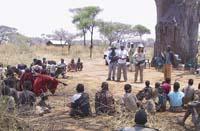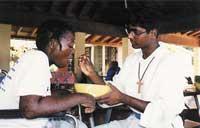The shadow of the mandela in scientific development
2013/12/13 Galarraga Aiestaran, Ana - Elhuyar Zientzia
When Nelson Mandela's legacy to his people and the world is being won, his work of scientific and technological sovereignty is hidden. That is what at least the researcher Calestous Juma thinks.
Juma, head of projects for the development of agriculture in Africa and director of the Center for International Studies at Harvard University, has published in the journal New Scientist an article entitled: Mandela’s unsung legacy of science in Africa, that is, “Mandela’s undeclared heritage in African science”, approximately.
Mandela’s famous phrase on education is known, “education is the most powerful weapon to change the world.” The author of the article goes further and recalls the African Institute of Science and Technology, created under the name of Mandela. Two are already underway, one in Tanzania and the other in Nigeria, and they plan to make a third in Burkina Faso.
According to Juma, with these institutes Mandela wanted to cover a gap. He believed that Africa did not succeed in exploiting its rich natural resources, because it lacked human capital, scientific wisdom and infrastructure. With the institutes, Mandela wanted to sow the scientific-technical knowledge essential for the economic development of Africa.
In addition, the author cites in his article the distinction between universities and institutes. In general, universities are limited to teaching and institutes to research. According to Juma, it is necessary to join both paths. In this sense, he considers that much work will still have to be done, but he does not doubt that Mandela's contribution has been fundamental to take these first steps. It should also be noted that the African Institutes of Science and Technology, known as Nelson Mandela, overcome the borders of the South African Republic.
Aside from scientific-technological training, they have also recalled their attitude towards AIDS. For example, Science and The Lancet have praised their work in this field. However, on the web of U.S. television Frontline have denounced that it supported the fight against AIDS too late. To this end, they recalled an interview with a judge of the Constitutional Court of the Republic of South Africa in 2009.
The judge, named Justice Edwin Cameron, was one of the actors in the fight against AIDS when Mandela came to lead the government. In his opinion, if the expression of others could influence the fight against AIDS was Mandela. But he remained silent.
Cameron recognizes that later, from 2001, Mandela had a new attitude, both verbal and of action. In 2005, for example, he acknowledged that his son Makgatho had been killed by AIDS, a statement that was of great importance to those suffering from the stigma of the disease. In Cameron's opinion, however, Mandela's influence was not as significant as what he could have when he ruled, and it was too late to slow the spread of the plague (when he was appointed president, Cameron recalls that the percentage of infected was 5%, very small compared to the current one). Agridulce, therefore, together with those who only remember the sweetest.
Published in the newspaper Berria.

Gai honi buruzko eduki gehiago
Elhuyarrek garatutako teknologia






